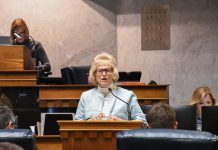“EPA is working across the federal family to ensure that our research on the potential health concerns associated with PFAS is properly coordinated, complementary, and avoids unnecessary duplication,â€Â said EPA Administrator Andrew Wheeler. “This workshop will highlight the depth of PFAS research across the federal government and identify data gaps.â€
“This independent review by the National Academies is an important step to leverage the extensive work ongoing across federal entities and will help determine what further research needs to be conducted in order for us to most effectively continue our PFAS response. As the Chair of DoD’s PFAS Task Force, I will tell you that DoD’s participation in this workshop is part of the Department’s commitment to ensure the health and safety of our men and women in uniform, their families, and the communities in which we serve,â€Â said Jordan Gillis, Assistant Secretary of Defense for Sustainment.
“USDA supports measures that foster healthy, viable, and sustainable agricultural farming practices,â€Â said Dr. Scott Hutchins, Deputy Under Secretary for USDA’s Research, Education, and Economics Mission Area. “This public-private collaboration is a critical step in finding workable solutions for our nation’s farmers.â€
“Similar to other agencies within the federal family, understanding the health effects of exposures to PFAS continues to be a priority for the Centers for Disease Control and Prevention (CDC) and the Agency for Toxic Substances and Disease Registry (ATSDR),â€Â said Dr. Robert Redfield, Director of the CDC and Administrator of ATSDR. “This virtual workshop with the National Academies is a welcomed opportunity to discuss and contribute to the growing body of knowledge on this topic.â€
The National Academies will organize a two-day virtual public workshop to review federal agency research on PFAS and identify research and data gaps. The workshop should take place in the Fall. Following the workshop, a report will be assembled summarizing the views of participants on how to ensure that the federal research program for PFAS is robust and focused on addressing the highest priority human health concerns. The proceedings will be made available to participating federal agencies and to the public.
Federal agencies are spending significant resources to better understand PFAS chemistries, sample collection, compound identification and quantification, toxicities (including health effects in humans), fate and transport, occurrence and exposure, environmental removal and degradation, and treatment and disposal. U.S. federal agencies conducting research on PFAS include USDA, EPA, DoD, HHS (National Institutes of Health, National Institute of Environmental Health Sciences, ATSDR, CDC, and U.S. Food and Drug Administration), U.S. Department of the Interior (U.S. Geological Survey), U.S. Department of Transportation, and Department of Homeland Security. The scientific and technical input resulting from this workshop will help to ensure the robustness of Federal research programs in this important area.




